Wondering if turkeys and chickens can live together in the same coop? It’s a common question for anyone starting backyard flocks. The idea of everyone living peacefully together is nice especially if you’re limited on space.
It seems simple given that both are birds, both need food and shelter, and they’re both kinda cute. However, is a mixed flock possible?
Content
- Blackhead Disease
- How to Safely Raise Chickens and Turkeys Together
- Considerations for Meat Turkeys
- Raising Turkeys with Egg-laying Chickens
- Coop Considerations for Raising Turkeys and Chickens
- Social Dynamics of Raising Turkeys and Chickens Together
Can Turkeys and Chickens Live Together
The short answer is yes, turkeys and chickens can happily live together. But before you throw them in together, there are a few things to keep in mind. Turkeys and chickens each have their own quirks, habits, and health concerns. Let’s talk about whether these two will make good coop mates.
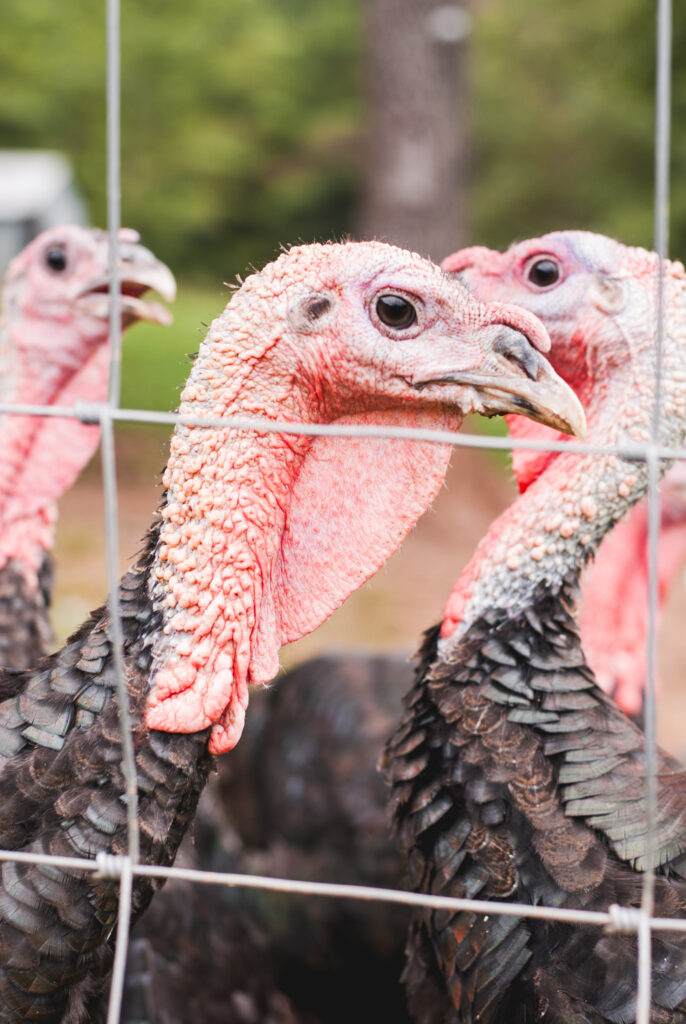
*This post may contain affiliate links which means I make a small commission at no extra cost to you. Read my full disclosure here.*
Blackhead Disease
Blackhead disease is a deadly disease and has been known to infect several different species of birds including chickens, turkeys, grouse, quail, and pheasant. This is the biggest problem with raising turkeys and chickens together. While the disease can be found in wild turkeys, it’s more commonly found in domestic birds.
Blackhead disease, or histomoniasis, is caused by a parasite called Histomonas meleagridis. It’s mostly spread through tiny worms called the cecal worms which lives in the intestines of chickens. The tricky part is that the chickens can carry the disease without getting sick, but it can cause liver damage which may be fatal if it’s passed to the turkeys.
When the chickens poop, the cecal worm eggs will come out and can hang around the soil. They will eventually be eaten by earthworms. Turkeys that free range peck around the same spots where chickens have pooped can pick up the parasite and get sick.
This is why it’s different from raising chickens and pigs together. Chickens and pigs don’t pass stuff to each other. With chickens and turkeys, they can share the same diseases.
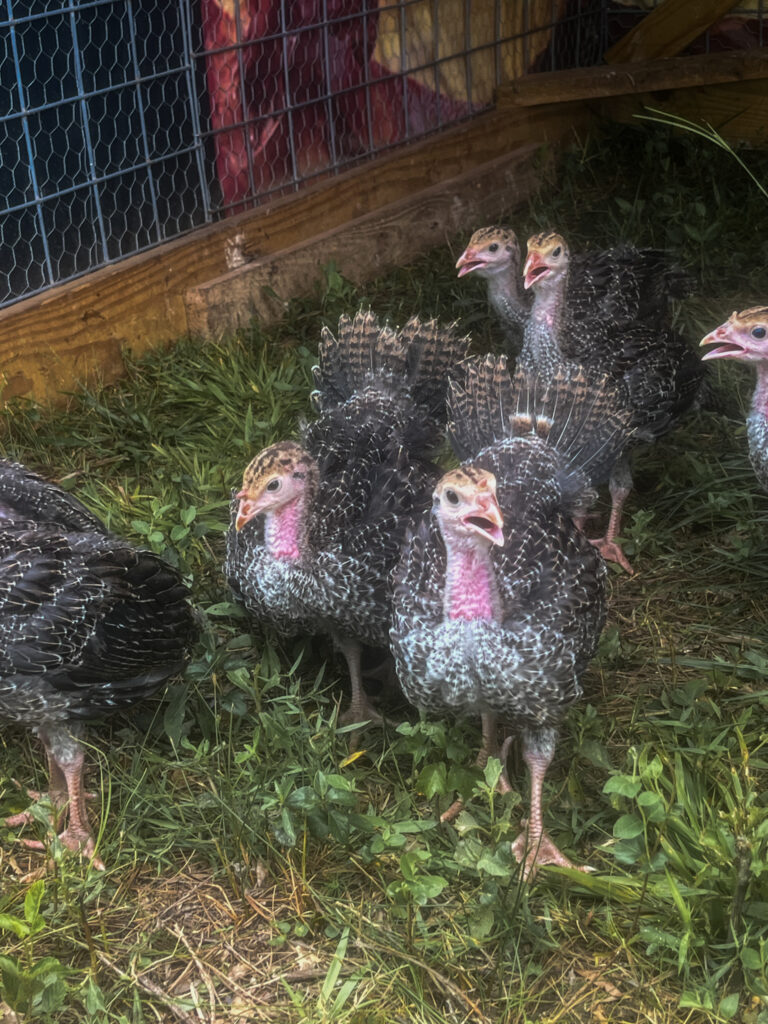
How to Safely Raise Chickens and Turkeys Together
I’ve been able to successfully raise my flock of laying hens with my turkeys. There are just a few considerations to keep in mind.
First of all, if you’ve got turkey chicks or turkey poults, keep them separate from chickens at the start. Poults are more susceptible to the diseases adult chickens might carry, so it’s best to give them their own space until they are bigger and stronger. I use my portable turkey tractor for this. I also brood chicks separately from poults.
You may want to keep a flock of turkey hens for turkey eggs. Turkey eggs are larger and have a rich yolk compared to chicken eggs. If this is the case, you can let them mix with the chickens when they are older.
Also, if you choose to raise heritage turkeys, they’re known for their hardness. Free-range turkeys are also more robust since they tend to have more of a varied diet.
Rotational grazing will also minimize the risk of infection. Moving them around to fresh pasture means there’s less chance for disease to build up in one spot. It’s also great for the health of your pasture and backyard.
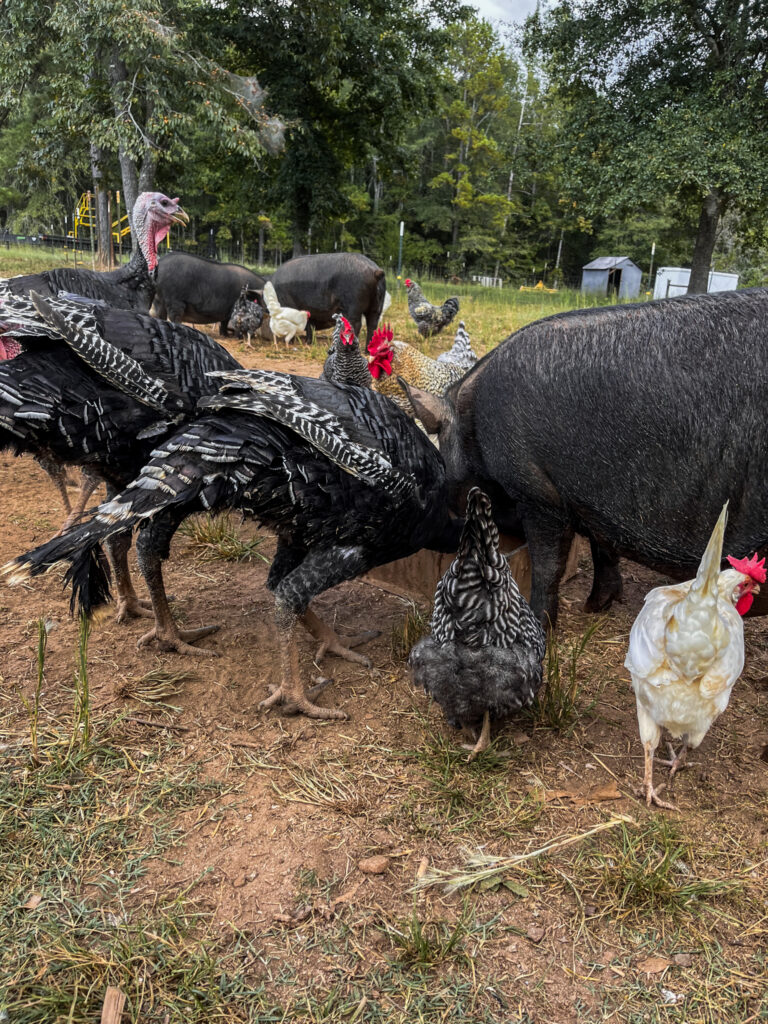
Considerations for Meat Turkeys
Raising meat turkeys and meat chickens together sounds pretty good idea, especially if you’re aiming to stock your freezer with a variety of meats. However, there are some risks you should consider before putting them in the same space.
The most significant risk of raising meat turkeys and chickens together is the potential for disease transmission. Chickens, while generally hardy, can carry diseases that don’t affect them much but can be devastating to turkeys. However, Cornish Cross Meat birds are also more susceptible to health issues than heritage breeds. It made be a good idea to keep meat birds in a separate area.
Another issue is space. Meat turkeys can get very large, especially the broad-breasted breeds that are popular for meat production. They need ample room to move, so crowding them with chickens can lead to stress, which will weaken their immune system. Be sure to avoid overcrowding if you’re raising meat turkeys and meat chickens together.
Also, meat turkeys need a high-protein diet to support their rapid growth, while meat chickens need less. If you mix the two, you might find it tricky to meet the nutritional needs of both without one group getting too much or too little of something. Always feed your turkey flock in a separate area from your chicken flock.
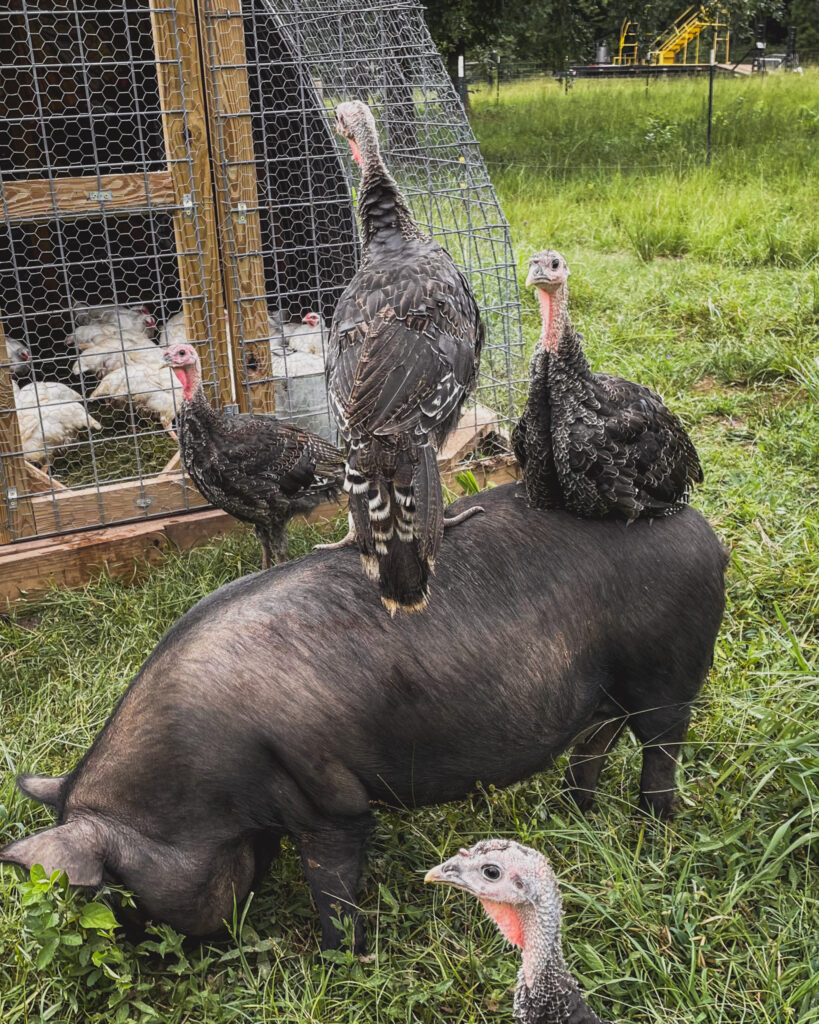
Raising Turkeys with Egg-laying Chickens
Raising turkeys with egg-laying chickens also has a unique set of considerations. Egg-laying chickens love to have a routine. They enjoy roosting up high, scratching around, and laying eggs.
If you have a broody hen, she’ll need a quiet space away from the turkeys. A large coop is an absolute must.
Also, be sure the opening coop, and the route to get into it are accessible to adult turkeys. They can’t fit through the tiny doors that chickens can.
Be sure to place turkey nesting boxes away from the chicken roosts. Chickens produce a lot of manure, especially at night. You don’t want chicken waste in the turkey nesting boxes.
Egg-layin chickens also require extra calcium to keep eggshells strong and support production. Layer feed has extra calcium in it. Turkeys don’t need as much calcium because they aren’t laying eggs as much as chickens. Too much calcium can be harmful to turkeys, especially turkey poults because it causes kidney issues.
If you’re raising female turkeys, their dietary needs are closer to those of egg-laying chickens. They require more calcium than non-laying turkeys. You may want to give turkey hens calcium supplements like oyster shells or crushed eggshells to support their egg production.
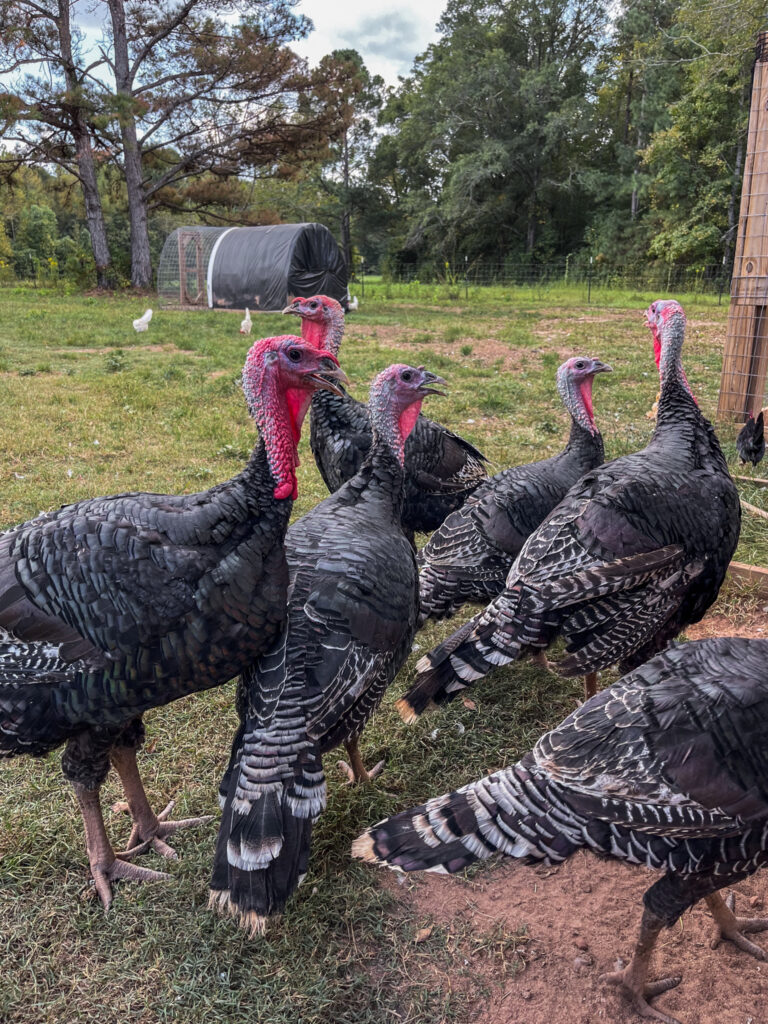
Coop Considerations for Raising Turkeys and Chickens
Turkeys are big…really big. So if you’ve got a small chicken coop you might run into problems. Turkeys are going to need a lot more space than chickens. They need at least 10 square feet of space per turkey.
Chickens also like to roost up high in the coop on a sturdy stick or bar. Bigger turkeys may not be good at climbing and prefer a lower roost just a few feet off the ground. If your roost is too high, the turkey can get hurt trying to get up there. However, my turkeys are capable of getting to a high roost.
Chickens will also need nesting boxes to lay their eggs. They like for their nests to be off the ground. Turkeys are fine with bigger nesting boxes on the ground.
Turkeys will get cold more easily than chickens. While they both need a coop that’s well ventilated be sure that the coop isn’t drafty. You don’t want your turkeys shivering at night.
I raise my turkeys in a separate hut away from the main coop. While both flocks share pasture space, they have separate coops specifically designed for their needs. If you’re designing a coop, be sure to keep both species in mind.
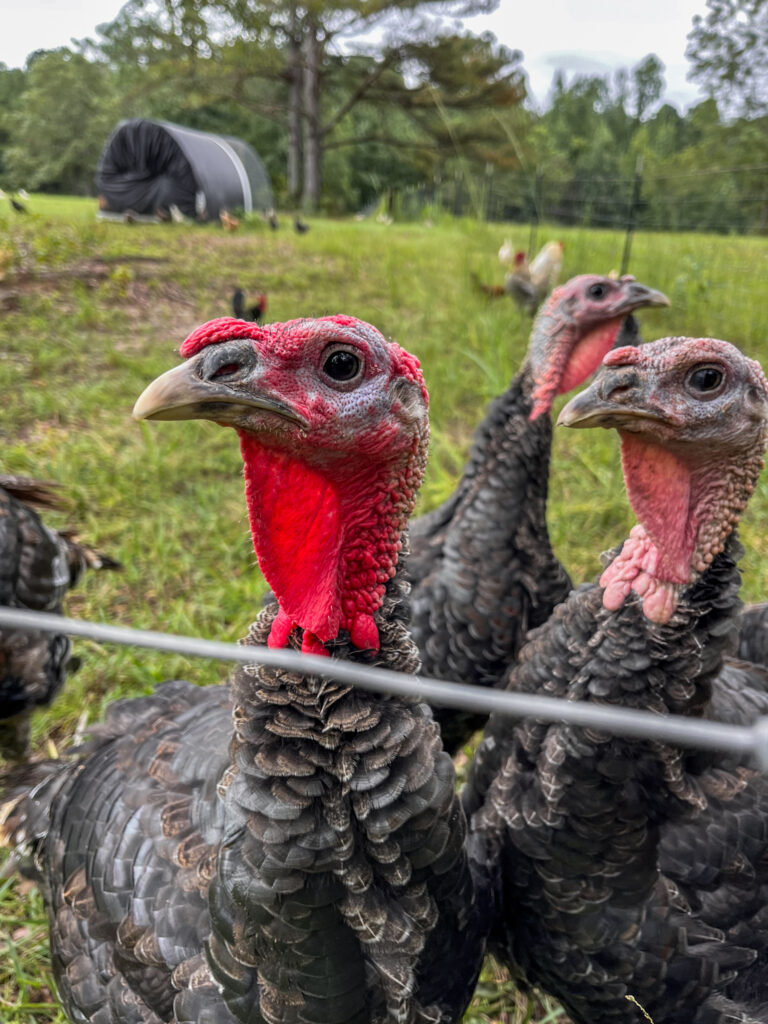
Social Dynamics of Raising Turkeys and Chickens Together
If you’re raising turkeys and chickens together, you’ll quickly find that they have very different personalities.
Chickens are full of energy and are always running around, pecking at everything. They’re curious and love to scratch, finding bugs or seeds to eat. Chickens are also fairly bossy. They have a literal pecking order of top chickens that call the shots. The pecking order will lead to some disagreements in the flock, but it’s just part of their social life.
Turkeys are way more laid back and are happy just hanging around. They don’t get as worked up as chickens do.
They’re also social animals and can be pretty friendly and affectionate, kind of like dogs. Our turkeys greet us in the pasture and follow us around waiting for treats.
Because of their personality differences, you’ll need to keep an eye on how they interact. If you’ve got a bunch of feisty chickens, they might try to boss the turkeys around. This can be a problem if they start pecking at the turkeys or hogging all the food.
Turkeys usually don’t get aggressive unless provoked, but if they do they’re much bigger and can do some damage. It’s important to make sure everyone has enough space and their own feeding and drinking spots.
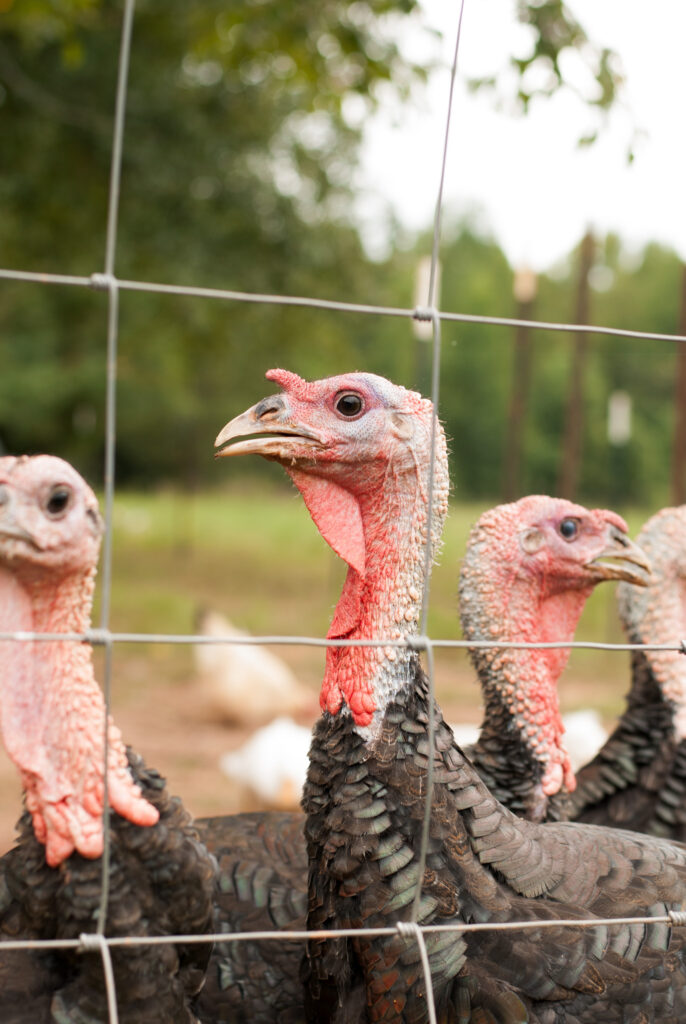
FAQs About Raising Turkeys and Chickens Together
Do turkeys need grit like chickens?
Yes, turkeys need grit just like chickens Grist helps them to digest food, especially fibrous or hard foods like seeds and grains.
Turkeys don’t have teeth. Instead, they rely on the gizzard to grind down food. Grit helps their gizzard break down food.
How much space do turkeys need in the coop?
Turkeys need at least 10 square feet per bird in the coop, while chickens typically require 2-4 square feet of space each. Providing plenty of room will help to reduce stress in the birds and prevent overcrowding. Learn more about how big a chicken coop should be.
How can I prevent disease when raising turkeys with chickens?
You can help to prevent disease by keeping the coop clean, having separate feeding and watering stations, and keeping baby turkeys and young birds away from chickens until they grow into a large turkey. Rotating pasture is also helpful.
As always, watch for signs of illness in your birds. Call a poultry vet if you notice any concerning symptoms.
Do turkeys and chickens have different feeding requirements?
Yes, turkeys need a higher-protein diet compared to chickens. Chickens that lay eggs also require extra calcium for their eggshells. It’s best to have separate feeders to make sure each species gets the nutrition they need.
Can turkeys and chickens roost together?
Turkeys and chickens have different roosting preferences. Chickens prefer higher roosts, while turkeys, especially large breeds, are more comfortable with lower roosts. It’s important to have roosts that accommodate both species.
Also, be sure to consider the width of the turkey as being much wider than a chicken. You’ll need more roosting space if you’re raising your birds together.
How do turkeys and chickens interact in the same space?
Generally, turkeys are more laid-back, while chickens can be more active and assertive. If you give them enough space, they’ll usually get along. Conflicts can happen if the coop is too crowded or there is competition for food.
Can turkeys and chickens be raised together for meat production?
Yes, but it’s important to ensure that they have enough space and separate feeding areas. Turkeys grow larger and need more room, while chickens have different growth rates and feeding requirements.
What should I do if a turkey or chicken gets sick?
If you suspect that one of your birds is sick, isolate them from the rest of the flock. Call a poultry veterinarian for guidance. If you remove sick birds quickly, it can prevent the spread of the disease to other birds.
What are the benefits of raising turkeys and chickens together?
There can be benefits, such as more efficient use of space, and diversity in your products like eggs and meat. However, you have to manage them properly to reduce the risks that come along with mixing different species.
Can Turkeys and Chickens Live Together? Final Thoughts
Turkeys and chickens can live together, but you have to be smart about it. These birds have different needs and habits, so just be aware of them to make it work.
Blackhead disease is a big concern since it can spread from chickens to turkeys and cause serious issues. It’s important to keep the coop clean and keep turkey poults separate until they grow.
Turkeys need more space than chickens, so make sure you have a large coop where they won’t be squished together.
Also, keep an eye on feeding, since turkeys and egg-laying chickens need different nutrients.
If you manage all this and give everyone room to roam, turkeys and chickens can be happy in the same flock.
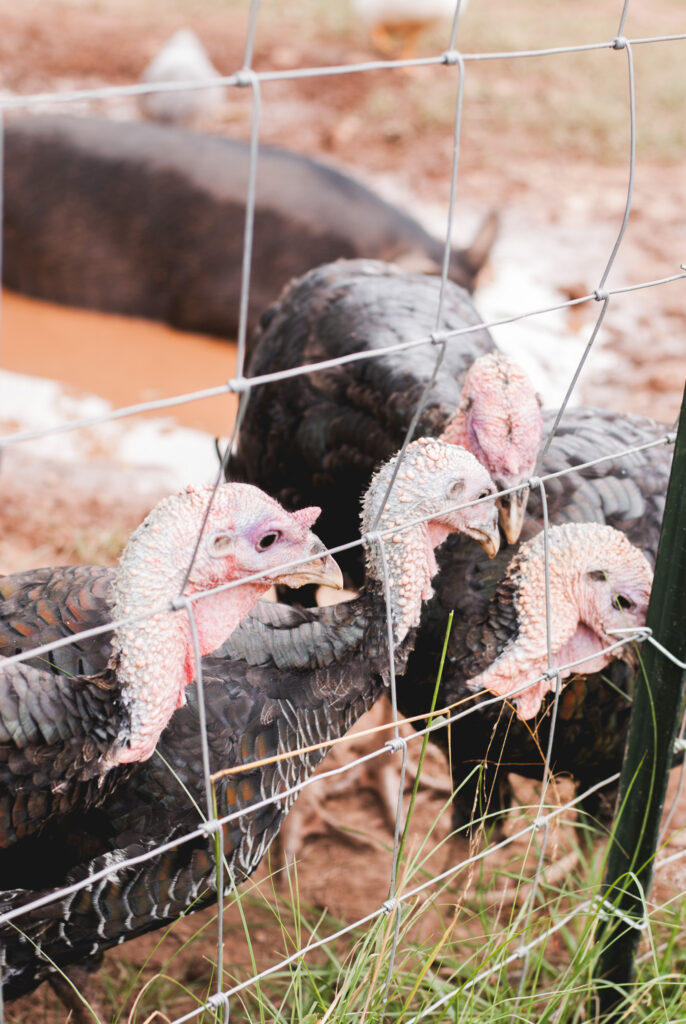
Supplies for Raising Turkeys
- Large roosting bars – Turkeys need large, sturdy roosting bars to hold their weight and size.
- Oyster Shells -Turkey hens that lay eggs need additional calcium in their diets
- Grit – Grit helps the turkey digest food.
- High protein feed – Turkeys need a higher protein in their feed than chickens do.
- Coop – Providing your turkeys with a large coop will help to keep them healthy and happy.
If you enjoyed “can turkeys and chickens live together” please share it! Thanks for visiting my farm.
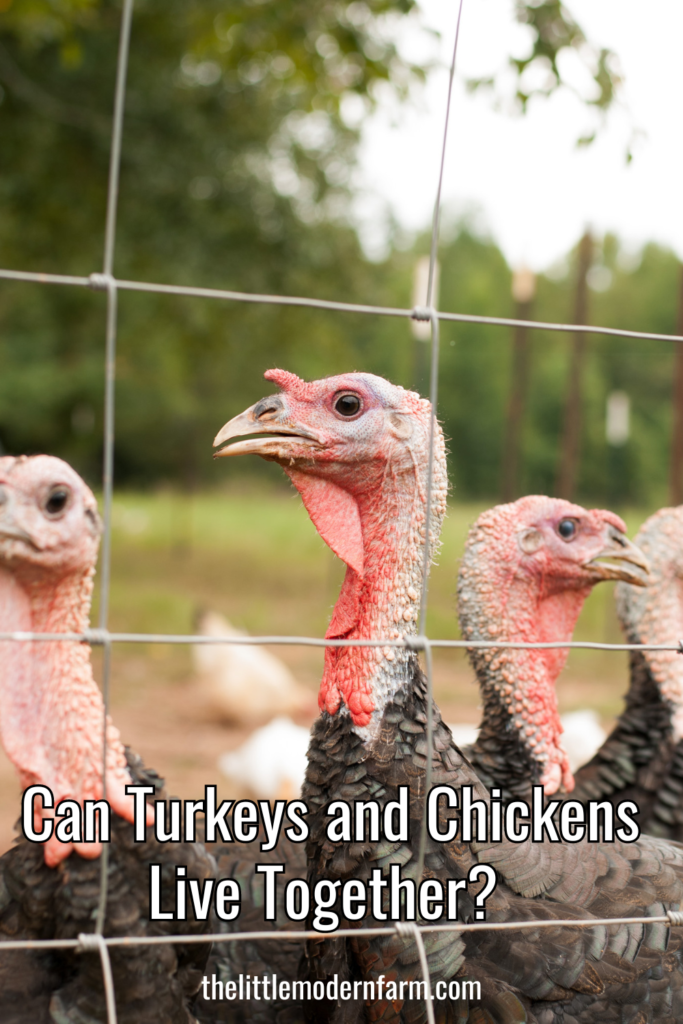
More From The Farm
Have you wondered how to raise chickens and ducks together?
Ducks and chickens can happily live together, but you have to understand their different needs. Here I’m going to show you how you can successfully combine your flock of feathered friends….
[…] Can Turkeys and Chickens Live Together? […]